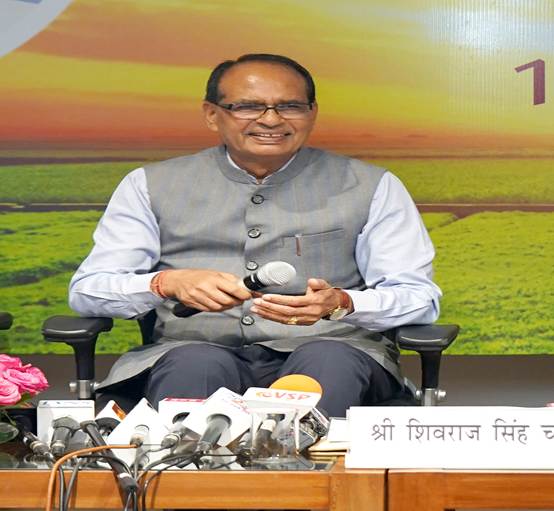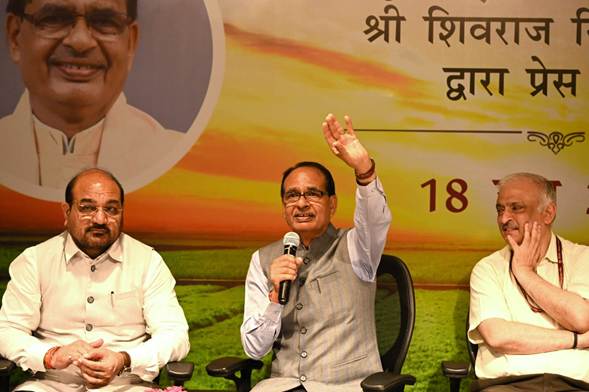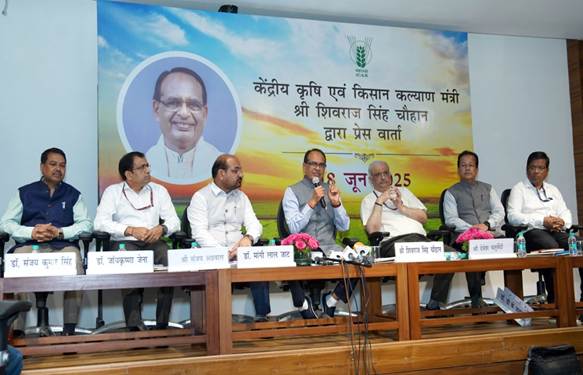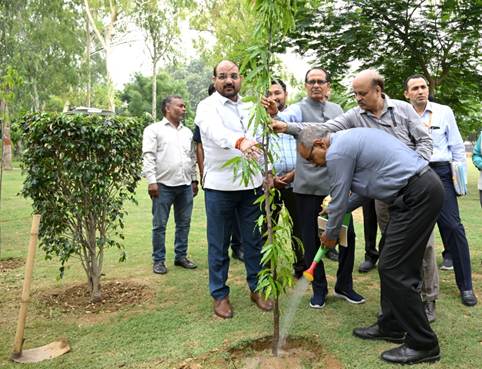“We will take forward the success of the Viksit Krishi Sankalp Abhiyan; this campaign will not stop” – Union Minister Shri Shivraj Singh Chouhan
“We will take forward the success of the Viksit Krishi Sankalp Abhiyan; this campaign will not stop” – Union Minister Shri Shivraj Singh Chouhan
Union Minister of Agriculture & Farmers’ Welfare and Rural Development, Shri Shivraj Singh Chouhan, lauded the Viksit Krishi Sankalp Abhiyan as a highly impactful initiative that has achieved widespread success across the country. He emphasized that the campaign is not a one-time effort, it marks the beginning of a sustained movement to modernize Indian agriculture and enhance farmers’ prosperity through direct field-level engagement. As part of the campaign, 2,170 teams comprising scientists, officials, and agricultural experts visited over 1.42 lakh villages, directly interacting with more than 1.34 crore farmers. The initiative witnessed active participation from Chief Ministers, Union Ministers, State Ministers, Members of Parliament, MLAs, and a large number of grassroots representatives.

The Union Agriculture Minister, while addressing the media, announced a series of immediate measures to enhance agricultural development and farmer welfare. He emphasized the need to bridge existing gaps in knowledge, research, and institutional capacities to ensure tangible benefits for farmers. Highlighting the critical role of Krishi Vigyan Kendras (KVKs), the Minister stated that KVKs will be designated as nodal agencies in every district. These will operate as coordinated teams dedicated to addressing farmers’ needs. Efforts will also be undertaken to bring uniformity and structural strengthening to the KVK system across the country. To ensure direct engagement with farming communities, KVK scientists will now be mandated to spend at least three days a week in the field. Reaffirming his personal commitment, Shri Chouhan added that he himself will visit farms two days a week to connect with farmers on the ground and understand their issues first-hand.

Shri Chouhan stressed that true understanding of agricultural challenges cannot be achieved by sitting in air-conditioned office. Therefore, field engagement will become a core operational priority for all agricultural personnel. At the national level, Shri Chouhan underlined the need for greater coordination among all institutions working towards progressive agriculture and farmer prosperity. To streamline efforts, he announced the establishment of a centralized coordination mechanism to align the functioning of key stakeholders. Additionally, the Indian Council of Agricultural Research (ICAR) will appoint a State-wise Nodal Officer for agriculture. This officer will be responsible for overseeing scientific trials, identifying state-specific challenges, offering expert advice, and maintaining close communication with state governments. The objective is to ensure that scientific insights and policy responses are tailored to the unique needs of each region.The Minister also assured that he, along with senior officials, will hold regular consultations with state governments to align strategies and deliver regionally relevant agricultural solutions.

Shri Chouhan flagged two pressing concerns highlighted during the campaignsubstandard seeds and pesticides. In response, the Ministry will take strong measures to strengthen the Seed Act and ensure stringent quality control mechanisms, so that only certified, high-quality inputs reach farmers. “This campaign aimed to fill up the gap between the research labs and the agricultural fields. We’ve seen remarkable work happening, but challenges persist. Our focus must now be on increasing productivity, reducing input costs, and ensuring that agriculture becomes a profitable and sustainable livelihood for every farmer,” he added.

He praised the efforts of ICAR and the Ministry of Agriculture for the successful execution of the campaign and announced that it will be relaunched during the Rabi season. Additionally, targeted follow-up actions will commence with a dedicated Action Plan for Soybean. A stakeholder consultation for soybean will be held on June 26 in Indore, followed by similar missions on cotton, sugarcane, pulses, and oilseeds, the Minister informed. A national-level meeting in hybrid mode is scheduled on June 24 at the Pusa Institute, where scientists, agricultural officers, and state agriculture ministers will review campaign outcomes. Nodal officers will present comprehensive reports on state-wise agricultural conditions, laying the groundwork for collaborative efforts between the Centre and states. The meeting will also explore future research priorities and structural reforms.
Shri Chouhan stated that under the leadership of Prime Minister Shri Narendra Modi, food grain production has risen by 40% in the last 11 years, a result of consistent and strategic policy implementation. “Our mission is to ensure food security, nutritional availability, and profitable farming while preserving soil health for future generations. India must emerge as a global food basket, he said.
Shri Chouhan outlined the vision of “One Nation – One Agriculture – One Team,” emphasizing the need for an integrated platform where farmers, scientists, institutions, and policymakers collaborate to achieve the common goal of developed agriculture and farmer prosperity.
The campaign emphasized inclusive outreach, with special focus on underserved regions:
A key highlight of the campaign was the Kisan Chaupals, which facilitated direct and meaningful dialogues between scientists and farmers. Discussions included agro-climatic suitability of crops, seed varieties, soil health, and pest management. Two significant insights emerged:
Several farmers also raised policy-related concerns, such as:
Highlighting the importance of farmer-driven policymaking and demand-driven research, Shri Chouhan stated that these recommendations will be integral for future policy development. He also said that ‘the field is the most authentic laboratory, and the farmer’s voice must guide our path.’ The press conference was also attended by Shri Devesh Chaturvedi, Secretary (MoA&FW) and Dr. M.L. Jat, Secretary (DARE) and Director General (ICAR).
- Localized research is critical—research priorities must be informed by ground realities, not just central directives.
- Farmers as innovators—many farmers demonstrated indigenous innovations tailored to local needs, surprising even seasoned scientists.